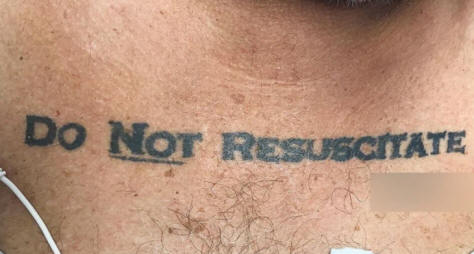
The Great Smoky Mountain Journal
Staff, Wire Reports
Posted: Sunday, January 21, 2018 07:25 PM
Emergency Room Docs Taken Aback By "Do Not Resuscitate" Chest Tattoo On Patient
Emergency room doctors at a University
of Miami hospital faced a vexing ethical dilemma when paramedics wheeled
in an unconscious man with a “Do Not Resuscitate” chest tattoo.
The case is described in a case study published Thursday in the New
England Journal of Medicine.
Doctors treating the 70-year-old diabetic patient at first began
lifesaving efforts. The patient had an elevated blood alcohol level and
a history of pulmonary disease.
But tattooed "do not resuscitate" requests are not considered valid by
the Florida Department of Health and the doctors were unable to
immediately locate the man's family members or even identify him.
“We initially decided not to honor the tattoo, invoking the principle of
not choosing an irreversible path when faced with uncertainty,” the
University of Miami doctors write in the case study.
So they began administering antibiotics and intravenous fluids.
“This decision left us conflicted owing to the patient’s extraordinary
effort to make his presumed advance directive known,” the doctors write.
“Therefore, an ethics consultation was requested.”
Ethics consultants soon advised the doctors that the tattoo likely
represented his wishes and should be honored.
The consultants told the physicians that “the law is sometimes not
nimble enough to support patient-centered care and respect for patients’
best interest,” according to the doctors.
After a DNR order was written, officials found an official copy of the
man’s DNR order from the Florida Department of Health. He died overnight
without further lifesaving efforts, the doctors write.
“We were relieved to find his written DNR request, especially because a
review of the literature identified a case report of a person whose DNR
tattoo did not reflect his current wishes,” the doctors add.
Gregg Re is an editor for Fox News. Follow him on Twitter @gregg_re.

